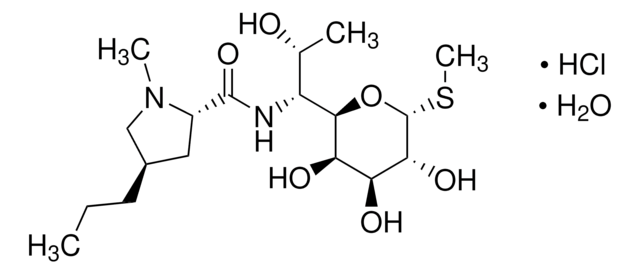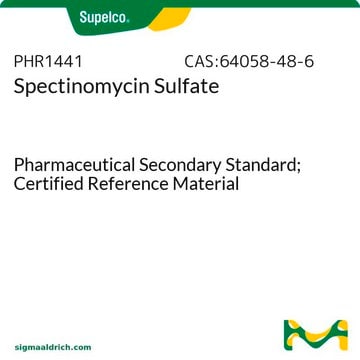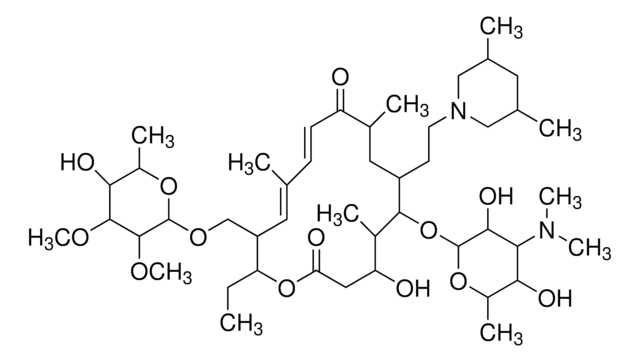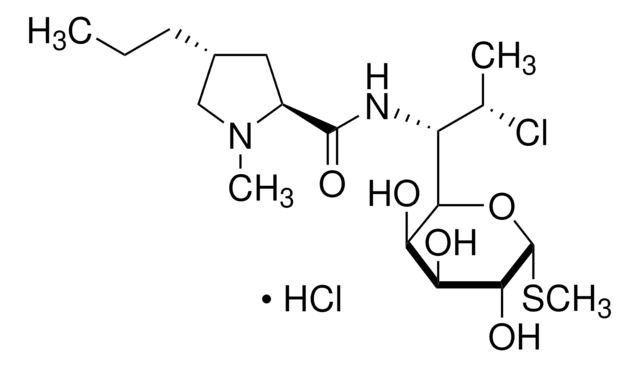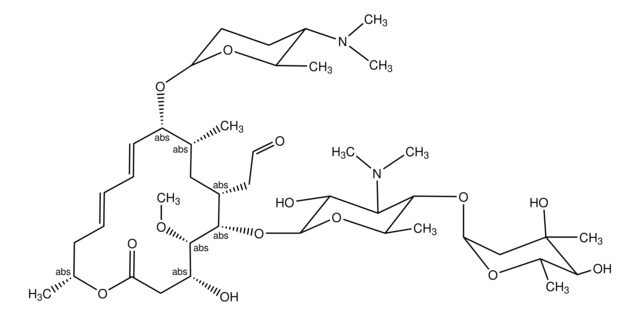62143
Lincomycin hydrochloride
96.0-102.0% (HPLC)
Sinónimos:
Lincocin hydrochloride, Methyl 6,8-dideoxy-6-(1-methyl-4-propyl-2-pyrrolidinecarboxamido)-1-thio-D-erythro-α-D-galactooctopyranoside hydrochloride
About This Item
Productos recomendados
Quality Level
assay
96.0-102.0% (HPLC)
form
powder or crystals
impurities
≤5% water
color
white to off-white
solubility
H2O: 50 mg/mL, clear, colorless to faintly yellow
antibiotic activity spectrum
Gram-positive bacteria
mode of action
protein synthesis | interferes
storage temp.
2-8°C
SMILES string
Cl.CCC[C@@H]1C[C@H](N(C)C1)C(=O)N[C@H]([C@@H](C)O)[C@H]2O[C@H](SC)[C@H](O)[C@@H](O)[C@H]2O
InChI
1S/C18H34N2O6S.ClH/c1-5-6-10-7-11(20(3)8-10)17(25)19-12(9(2)21)16-14(23)13(22)15(24)18(26-16)27-4;/h9-16,18,21-24H,5-8H2,1-4H3,(H,19,25);1H/t9-,10-,11+,12-,13+,14-,15-,16-,18-;/m1./s1
InChI key
POUMFISTNHIPTI-BOMBIWCESA-N
¿Está buscando productos similares? Visita Guía de comparación de productos
Categorías relacionadas
General description
Biochem/physiol Actions
Antimicrobial spectrum: Lincomycin hydrochloride is effective against gram-positive bacteria.
Preparation Note
Other Notes
signalword
Warning
hcodes
Hazard Classifications
Eye Irrit. 2 - Skin Irrit. 2 - STOT SE 3
target_organs
Respiratory system
Storage Class
11 - Combustible Solids
wgk_germany
WGK 2
flash_point_f
Not applicable
flash_point_c
Not applicable
ppe
dust mask type N95 (US), Eyeshields, Gloves
Elija entre una de las versiones más recientes:
Certificados de análisis (COA)
¿No ve la versión correcta?
Si necesita una versión concreta, puede buscar un certificado específico por el número de lote.
¿Ya tiene este producto?
Encuentre la documentación para los productos que ha comprado recientemente en la Biblioteca de documentos.
Los clientes también vieron
Artículos
Antibiotics targeting bacterial ribosomes disrupt protein synthesis, a key process in bacterial growth inhibition.
Antibiotics targeting bacterial ribosomes disrupt protein synthesis, a key process in bacterial growth inhibition.
Antibiotics targeting bacterial ribosomes disrupt protein synthesis, a key process in bacterial growth inhibition.
Antibiotics targeting bacterial ribosomes disrupt protein synthesis, a key process in bacterial growth inhibition.
Nuestro equipo de científicos tiene experiencia en todas las áreas de investigación: Ciencias de la vida, Ciencia de los materiales, Síntesis química, Cromatografía, Analítica y muchas otras.
Póngase en contacto con el Servicio técnico